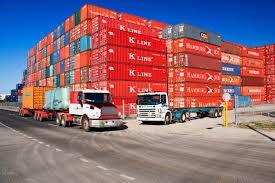Notifications
Container transport plays a crucial role in the economy of Melbourne, a bustling city that serves as one of Australia’s primary hubs for trade and logistics. As the gateway to international and domestic shipping, Melbourne’s transport services ensure the smooth movement of goods across ports, warehouses, and final destinations. With increasing demand for efficiency, reliability, and sustainability, understanding the nuances of container transport in Melbourne is essential for businesses and individuals involved in shipping and logistics.
This guide delves into the key aspects of container transport in Melbourne, including its importance, the services available, benefits, challenges, and tips for choosing the right provider.
Melbourne’s Port Phillip Bay is home to the Port of Melbourne, one of the largest and busiest ports in the Southern Hemisphere. This port facilitates the movement of millions of shipping containers annually, making container transport services critical for connecting Australia to global markets.
Container transport services handle the logistics of moving containers from the port to various locations, including:
Efficient transport ensures the timely delivery of goods, minimizing supply chain disruptions and supporting industries ranging from retail to manufacturing.
Container transport in Melbourne encompasses a wide range of services designed to meet diverse shipping needs. Here are the main types:
This service is ideal for businesses with large shipments requiring the exclusive use of a container. FCL transport ensures goods remain secure and separate from other shipments.
LCL transport is suitable for smaller shipments that do not require a full container. Goods from multiple shippers are consolidated into one container, offering a cost-effective option.
For perishable goods like food, pharmaceuticals, or flowers, refrigerated containers (also known as reefers) maintain specific temperature conditions during transit.
Specialized services are available for transporting hazardous materials, ensuring compliance with safety regulations and minimizing risks.
For large or uniquely shaped items, oversized container transport uses specialized equipment like flat racks or open-top containers.
Container transport services streamline logistics, enabling goods to move quickly and seamlessly from ports to final destinations. Advanced tracking technologies allow for real-time updates, reducing delays.
With services like LCL transport, businesses can share container space, reducing overall shipping costs.
Containers are designed to protect goods from damage during transit. Providers often offer insurance options to safeguard shipments further.
Many transport companies in Melbourne prioritize eco-friendly practices, such as using fuel-efficient vehicles and consolidating shipments to reduce carbon emissions.
Whether you need to transport frozen food or heavy machinery, there’s a container transport solution tailored to your needs.
Despite its advantages, container transport in Melbourne also faces challenges:
Melbourne’s busy roads can lead to delays in container transport, particularly during peak hours.
High volumes of shipments can cause congestion at the Port of Melbourne, impacting the efficiency of container handling and transportation.
Strict regulations regarding weight limits, safety standards, and hazardous materials require transport companies to remain vigilant and compliant.
Fuel prices, tolls, and labour costs can contribute to increasing container transport expenses.
Melbourne’s unpredictable weather can disrupt schedules, especially during storms or extreme heat.
Selecting the right container transport provider is crucial for ensuring smooth operations. Here are some factors to consider:
Look for companies with a proven track record in container transport. Positive reviews and testimonials from clients indicate reliability and professionalism.
Ensure the provider has a modern fleet of vehicles and equipment suited to your specific needs, whether for refrigerated goods or oversized containers.
Providers offering real-time tracking and advanced logistics software can enhance visibility and control over your shipments.
Choose a company that adheres to local and international regulations, ensuring your goods are transported safely and legally.
Opt for providers with clear pricing structures, avoiding hidden fees or unexpected charges.
Responsive customer service is essential for addressing concerns, resolving issues, and ensuring smooth communication.
As environmental concerns grow, many transport companies in Melbourne are adopting sustainable practices to reduce their ecological footprint. These include:
Businesses can align with environmentally conscious providers to meet their sustainability goals while maintaining efficient operations.
The container transport industry in Melbourne is evolving to meet changing demands. Key trends include:
From automated cranes at the port to AI-driven logistics planning, technology is enhancing efficiency and reducing human error.
Blockchain technology is being used to improve transparency, security, and efficiency in supply chain management.
The rise of e-commerce has increased demand for container transport services, especially for LCL shipments and last-mile delivery.
Equipped with IoT sensors, smart containers can monitor conditions like temperature, humidity, and location, ensuring better control over shipments.
Booking container transport services in advance ensures availability and can help secure better rates.
Properly packing and securing goods inside containers reduces the risk of damage and maximizes space utilization.
Provide detailed instructions to the transport provider, including delivery addresses, timelines, and special requirements.
Whenever possible, consolidate multiple shipments into one container to save costs and reduce environmental impact.
Use tracking tools to stay informed about the status of your goods, enabling quick responses to any delays or issues.
With ongoing investments in infrastructure, such as the expansion of the Port of Melbourne and improvements to road and rail networks, the future of container transport in Melbourne looks promising. Embracing digital technologies and sustainable practices will further enhance efficiency and competitiveness in the industry.
As global trade continues to grow, Melbourne’s position as a key logistics hub ensures that container transport will remain a vital component of its economy.
Container transport in Melbourne is a dynamic and essential service that supports industries and businesses across the region. From efficient logistics and sustainable practices to advanced technologies and versatile options, the industry continues to evolve to meet the demands of a fast-paced, globalized world. By understanding the services, challenges, and trends, businesses can make informed decisions and optimize their shipping operations, ensuring success in the competitive marketplace. Whether transporting perishable goods, oversized equipment, or everyday products, Melbourne’s container transport services offer reliable solutions for every need.
